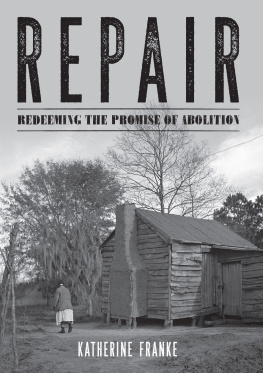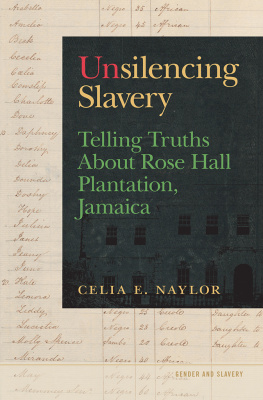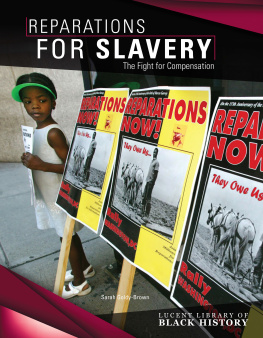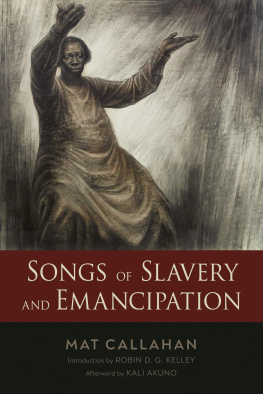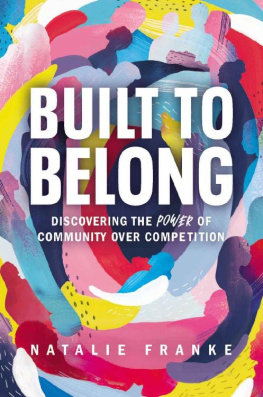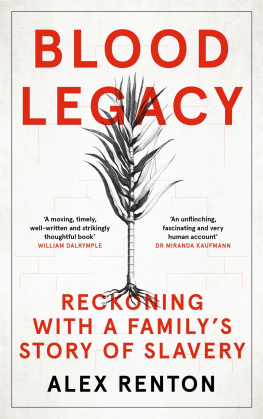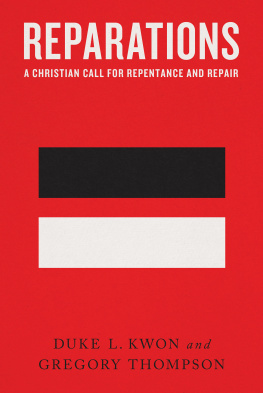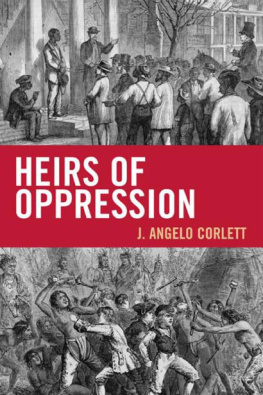
This eBook is licensed to Will Yang, williamyang1997@hotmail.com on 09/23/2019
Repair
This eBook is licensed to Will Yang, williamyang1997@hotmail.com on 09/23/2019
REPAIR
Redeeming the Promise of Abolition
Katherine Franke

This eBook is licensed to Will Yang, williamyang1997@hotmail.com on 09/23/2019
2019 Katherine Franke
Published in 2019 by
Haymarket Books
P.O. Box 180165
Chicago, IL 60618
773-583-7884
www.haymarketbooks.org
ISBN: 978-1-60846-626-9
Distributed to the trade in the US through Consortium Book Sales and Distribution (www.cbsd.com) and internationally through Ingram Publisher Services International (www.ingramcontent.com).
This book was published with the generous support of Lannan Foundation and Wallace Action Fund.
Cover design by John Yates.
Library of Congress Cataloging-in-Publication data is available.

This eBook is licensed to Will Yang, williamyang1997@hotmail.com on 09/23/2019
For Janlori and Maya
This eBook is licensed to Will Yang, williamyang1997@hotmail.com on 09/23/2019
Contents
This eBook is licensed to Will Yang, williamyang1997@hotmail.com on 09/23/2019
Introduction
The past is all that makes the present coherent, and further... the past will remain horrible for exactly as long as we refuse to assess it honestly.
James Baldwin, Notes of a Native Son (1955)
The sea islands of Georgia and South Carolina are stunningly beautiful. Travel + Leisure magazine describes the area in this way: On South Carolinas once-isolated Sea Islands, Gullah is still spoken, African traditions are carried on, and salty marshes perfume the air. The high-end travel magazine delights in the telling of a magnificent tour with a local preacher of the tidal and barrier islands on the Southeastern Atlantic coast. Welcome to the best place on Gods earth, says the man behind the wheel of the gray 1985 Oldsmobile. Born Joseph P. Bryant, he grew up speaking English, but gained fluency in Geechee and Gullahthe languages of his slave great-grandparents who toiled on the islands rice plantationsas a child.
The Travel + Leisure article goes on to praise the unique richness of the local culture on the Sea Islands, a place that has kept its African history and culture alive unlike anywhere else in the United States:
After the Civil War, the Gullahs were abandoned in the islands flung off the Carolina coast because the land was considered worthless. That abandonment and the century of isolation that followed have preserved the Gullah language, culture, and daily way of life. Families live for generations on the same farm, grow much of their own food, pick sweet grass to make baskets, and attend the one-room praise houses of their slave ancestors, where hymns are harmonized in Gullah and Geechee.
Vogue magazine describes Beaufort, one of the most beautiful ocean-side towns in the area: Today Beaufort is respected for its preservation of antebellum architectureclassic plantation style mansions with deep porches made for sipping Bittermilk mixed cocktails. Locals liken the town to a modest millionaire who never puts on airs.
The violence, torture, dehumanization, and brutality of slavery slide off the page in these tales, and in their place the travel writer delights the potential visitor with ancient and exotic African tongues, food, and civilization. If thats not enough of an enticement, articles describing the area also mention that the Sea Islands served as the settings for the blockbuster movies Forrest Gump and The Prince of Tides, movies in which white people are the protagonists, heroes, and only characters whose lives we are meant to care about.
Given this rich history, the Sea Islands are the site of a curious form of remembrance of the past coupled with strategic forgetting. The travel-magazine portrayal of the Islands history renders slavery a kind of quaint, benign historical note. In this telling, it was the migration of hundreds of thousands of Black people to the region that makes the Sea Islands such an alluring spot for tourists today. Mentioning that their migration was forced, in chains, and deadly would interrupt a plot animated by the dusky (one author actually uses the adjective dusky to describe the landscape) combination of Southern charm and exotic African traditions. The fact that the kidnapping and violent enslavement of Black people were the means by which African culture ended up in the Sea Islands lurks as a kind of bothersome and thus ignored fact, haunting the otherwise fabulous experiences to be had on the coast of South Carolina and Georgia today.
Narratives of local culture, like that provided by glossy travel magazines, reflect, perpetuate, and sometimes invent a palliative history that makes little in the way of moral demands on the present. These narratives of exoneration normalize a contemporary status quo by emplotting history in a way that severs the present from the past and renders the present ordering of life somehow inevitable. But as William Faulkner observed, especially about the South, The past is never dead. Its not even past.
That past has an enduring afterlife in the present, indeed its residue binds present injustice to unaddressed wrongs of the past. Repair makes the argument that the failure to provide any kind of meaningful reparation to formerly enslaved people in the 1860s has ongoing structural effects today. While the sources of contemporary Black poverty, disenfranchisement, and systematic disadvantage are complex, the original sin from which the evil of structural racism has grown is clear. It is chattel slavery: the unrelentingly vicious, sadistic, torturous enslavement and exploitation of Black people for profit. Emancipation put an end to the formal system of slavery, but as a prospective legal reform, emancipation did nothing to repair the rape, torture, death, and destruction of millions of human souls through the institution of chattel slavery. At the same time, slaveholders were never required to disgorge the profits they made from enslaved labor, or retroactively compensate enslaved people for the theft of their labor, safety, dignity, and lives. Quite the opposite, former slaveowners were compensated generously for their lost land and property with US tax dollars.
Property ownership is one of the key reasons why there is comparatively much more wealth held by white than Black people in the United States. The median wealth of white households in 2013
Formerly enslaved people entered civil society in the aftermath of the Civil War at a distinct economic disadvantage as compared with their former owners who retained all of the profits they had reaped from the purchase, sale, and use of formerly enslaved human beings. These income and accumulated family wealth disparities didnt just happen, rather they are the result of systematic, structural race discrimination in this country, much of it attributable to government policy. This book urges us to face our collective responsibility for ongoing racial inequality in the United States, and traces that responsibility back to the failure to provide meaningful repair, or reparations, to formerly enslaved people. By us I mean American society generally. Not just the descendants of enslaved people, not just the descendants of slave-owners, but all of us today who have inherited a legacy of opportunity that is ineluctably structured by our racial history.
Next page
